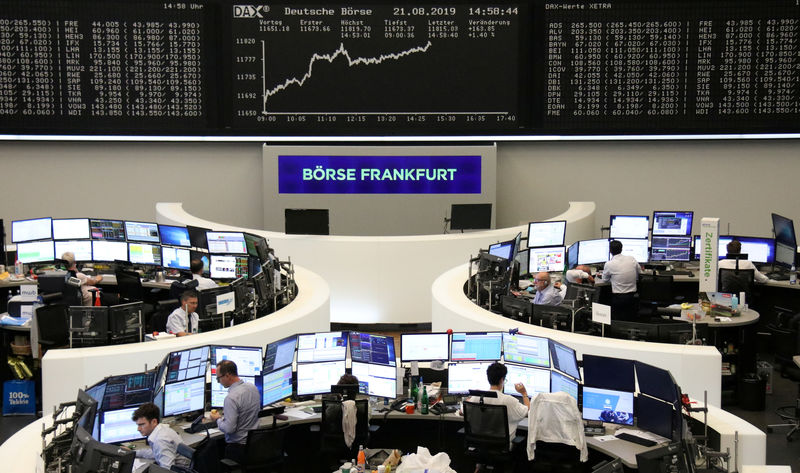By Simon Jessop
LONDON (Reuters) - AQR of the United States and Marshall Wace of Britain are among hedge funds to have taken sizeable positions over the past month to benefit from perceptions of European banks' vulnerability to recession.
Reuters analysis of short positions across European banking stocks in the EuroSTOXX Banks Index (SX7E) as at Aug. 19 showed six institutions were the object of bets large enough to warrant disclosure.
In a short trade, a fund pays to borrows shares from a long-term holder such as a pension fund and sells them into the market, hoping to buy them back after they have fallen in value and return them at a profit.
AQR Capital Management, a systematic fund house held a combined 6.01% across several of the six banks, while Marshall Wace, which uses both fundamental and systematic research processes, owned 4.87%.
Active managers captured in the regulatory filings include Lansdowne Partners, with a combined position of 3.06% and Oceanwood Capital, with 1.27%.
Of the 26 stocks in the EuroSTOXX Banks Index, five institutions from Spain, Portugal, Italy and one from Germany, reported shareholdings above the threshold.
The biggest combined short position was in Banco BPM (MI:BAMI) at 8.1%; with Unione Di Banche Italiane (MI:UBI) at 7.22%; Deutsche Bank (DE:DBKGn) at 5.02%; Banco Comercial Portugues (LS:BCP) at 2.97%; Banca de Sabadell (MC:SABE) at 1.5%; and FinecoBank Banca Fineco (MI:FBK) at 0.71%.
European Union regulations demand that any short position of at least 0.5% of a company's stock, and movements above that level, are disclosed at the end of every day's trade.
With little in the policymaker toolkit to prevent a slide into recession, markets have reacted negatively to corporate sectors most at risk such as banks, which could face lower loan growth, weaker returns from lending and losses from any souring loans.
Weakening economic data across the region have prompted the European Central Bank to signal that it will adopt fresh stimulus measures later this year, even though interest rates are at record lows and a large slice of local sovereign and corporate debt offers no returns to investors.
After falling in the run up to the ECB's July 25 meeting, the EuroSTOXX Banks Index extended its slide to 18% and a 7-year low, before recovering slightly to trade down 15% in the period to Aug. 19, helped in part by talk Germany may loosen government spending to help bolster its economy.
Despite this, many hedge funds were caught short by the fall in the value of the index, with few positioned to profit in size, the analysis showed.
For an interactive version of the graphic, click here https://fingfx.thomsonreuters.com/gfx/editorcharts/HEDGEFUNDS-EUROPE-BANKS/0H001QERF807/index.html.
Some of the companies in which funds had at least one big short position were hit even harder than the index between July 17 and their August low, including BCP, which was down 36%; Sabadell, down 25%; Bankia, down 28% and UBI, down 23%.
For interactive versions of the graphics, click here https://fingfx.thomsonreuters.com/gfx/editorcharts/HEDGEFUNDS-EUROPE-BANKS/0H001QERD801/index.html and here https://fingfx.thomsonreuters.com/gfx/editorcharts/HEDGEFUNDS-EUROPE-BANKS/0H001QERE804/index.html.
While the regulatory data does not capture short positions below 0.5%, industry tracker FIS Astec Analytics showed that seven out of every 10 shares in UBI and six out of every 10 shares in BPM that could be borrowed as part of a trade to profit from a falling share price was out on loan.
This suggests that there are a larger number of unnamed funds with a short position in both stocks under the regulatory threshold.

For an interactive version of the graphic, click here https://fingfx.thomsonreuters.com/gfx/editorcharts/HEDGEFUNDS-EUROPE-BANKS/0H001QERH80E/index.html.